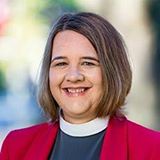by Kristen Glass Perez
The word lament can be used as a verb (to express sorrow, mourning, or regret) or a noun (wailing, crying out in grief).
In the Hebrew Bible, the book of Lamentations is made up of five poems that express grief over the destruction of Jerusalem and exile of the people in 586 B.C. (The Harper Collins Study Bible, by Lemke. Lamentations (1: 1-3; 4).
The destruction is described in 2 Kings 25:8-21:
“So the city was besieged until the eleventh year of King Zedekiah. On the ninth day of the fourth month the famine became so severe in the city that there was no food for the people of the land.” (vs 3-4)
 Lemke writes, “Lamentations is a unique literary composition addressed to the survivors of the destruction of Jerusalem and designed to help them come to terms with the realities and implications of that catastrophic experience. It has been suggested…that these poems were used in public rites of mourning.”
Lemke writes, “Lamentations is a unique literary composition addressed to the survivors of the destruction of Jerusalem and designed to help them come to terms with the realities and implications of that catastrophic experience. It has been suggested…that these poems were used in public rites of mourning.”
In 2020, we are again in a time of public mourning where we find ourselves navigating new identities and new ways of being. The COVID-19 global health crisis has forced us to reconcile many things that we thought were stationary: borders, jobs, symptoms of illness, essential employees, access to medical supplies and resources for help and comfort.
Physical and social distancing takes a toll on our bodies, minds, and spirits. The Biblical tradition of lament does not jump to easy answers but rather lets us sit deeply in the shock and awe of upheaval. It is a necessary part of the collective grief process. The following is a litany to use to help your community begin with lament.
A lament for COVID-19:
Leader: A reading from the book of Lamentations (1: 1-3; 4)
How lonely sits the city
that once was full of people!
How like a widow she has
become,
she that was great among the nations!
She that was a princess among
the provinces
has become a vassal.
She weeps bitterly in the night,
with tears on her cheeks;
among all her lovers
she has no one to comfort her;
all her friends have dealt
treacherously with her,
they have become her enemies.
The roads to Zion mourn,
for no one comes to the festivals;
all her gates are desolate,
her priests groan;
her young girls grieve,
and her lot is bitter.
L: In these days of anger and unanswered questions; in the pain of broken trust and shattered lives; in our compassion for all who are suffering; in our grief for all that has been lost,
Response: Lament.
L: From being too quick to attribute blame or demand forgiveness, for those who have harmed others by their actions or their inaction,
R: Lament.
L: For the loss of life, for the lost opportunities, for the secondary losses,
R: Lament.
L: For the in-person gatherings that bother us and the family togetherness that challenge us,
R: Lament.
L: For the inadequate distribution of resources and lack of protective equipment for healthcare workers,
R: Lament.
L: For previously ignoring the socially isolated among us,
R: Lament.
L: For denial and fear,
R: Lament.
L: Let us go now and actively work to build a future where truth is named and love and caring hold space for grief to heal.
R: Amen.
 The Rev. Kristen Glass Perez serves as College Chaplain at Muhlenberg College in Allentown, Pa. Egner Chapel at Muhlenberg College is the home of the first WELCA Campus Unit.
The Rev. Kristen Glass Perez serves as College Chaplain at Muhlenberg College in Allentown, Pa. Egner Chapel at Muhlenberg College is the home of the first WELCA Campus Unit.
Even if we aren’t able to gather in person right now as we’ve always loved to do, we can still support Women of the ELCA as we’ve always loved to do. Here are some easy ways to do that – online: welca.org/donate


I am grateful that my cousin, an ELCA pastor, shared this with me. Thank you for this.